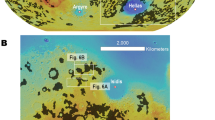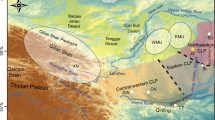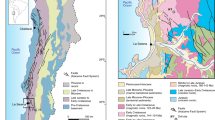Abstract
The formation of red beds has long interested geologists and pedologists1–3. It has been suggested that the nature and degree of reddening in dune sands can be a useful indicator of the relative age and environmental history of the sands; several authors have concluded that dune sands undergo progressive reddening with time4–7, and James and Stanley8 considered that coastal dunes might actually be mapped on the basis of colour. However, quantitative data regarding the rate of reddening in different environmental conditions are generally lacking. I present here radiocarbon evidence from north-east Australia which suggests that red weathering profiles have developed in stabilized dunes of Holocene age in humid tropical conditions within the past 7,500 yr.
This is a preview of subscription content, access via your institution
Access options
Subscribe to this journal
Receive 51 print issues and online access
$199.00 per year
only $3.90 per issue
Buy this article
- Purchase on Springer Link
- Instant access to full article PDF
Prices may be subject to local taxes which are calculated during checkout
Similar content being viewed by others
References
Krynine, P. D. Trans. N. Y. Acad. Sci. 11, 60–68 (1949).
Van Houten, F. B. in Problems in Palaeoclimatology (ed. Nairn, A. E. M. ) 647–661 (Interscience, New York, 1964).
Turner, P. Continental Red Beds (Elsevier, Amsterdam, 1980).
Price, W. A. Bull. geol. Soc. Am. 73, 1281–1289 (1962).
Norris, R. M. J. sedim. Petrol. 39, 7–11 (1969).
Dolan, R. J. J. sedim. Petrol. 40, 765 (1970).
Walker, T. R. US geol. Surv. Prof. Pap. 1052, 61–81 (1979).
James, N. P. & Stanley, D. J. Smithson. misc. Collns 152, 1–31 (1967).
Swanson, V. E. & Palacas, J. G. US geol. Surv. Bull. 1214–B (1965).
Ward, W. T., Little, I. P. & Thompson, C. H. Palaeogeogr. Palaeoclimatol. Palaeoecol. 26, 305–316 (1979).
Marshall, J. F. & Thorn, B.G. Nature 263, 120–121 (1976).
Walker, T. R. Bull. geol. Soc. Am. 78, 353–368 & 917–920 (1967).
Walker, T. R., Ribbe, P. H. & Honea, R. M. Bull. geol. Soc. Am. 78, 1055–1060 (1967).
Andriesse, J. P. Geoderma 3, 261–279 (1969–70).
Temple, A. K. Econ. Geol. 61, 341–348 (1966).
Reynders, J. J. Nova Guinea 6, 1–159 (1964).
Colombo, U., Fagherazzi, G., Gazzanini, F., Lanzavecchia, G. & Sironi, G. Nature 202, 175–176 (1964).
Gallagher, K. J., Feitrecht, W. & Mannweiller, U. Nature 217, 1118–1121 (1968).
Van Houten, F. B. Bull. geol. Soc. Am. 83, 2761–2772 (1972).
Pye, K. & Jackes, B. Proc. R. Soc. Qd 92, 37–42 (1981).
Schnitzer, M. & Khan, S. U. Humic Substances in the Environment (Dekker, New York, 1972).
Gardner, R. M. & Pye, K. Prog. phys. Geogr. (in the press).
Schmalz, R. F. Bull. geol. Soc. Am. 79, 277–280 (1968).
Author information
Authors and Affiliations
Rights and permissions
About this article
Cite this article
Pye, K. Rate of dune reddening in a humid tropical climate. Nature 290, 582–584 (1981). https://doi.org/10.1038/290582a0
Received:
Accepted:
Issue Date:
DOI: https://doi.org/10.1038/290582a0
Comments
By submitting a comment you agree to abide by our Terms and Community Guidelines. If you find something abusive or that does not comply with our terms or guidelines please flag it as inappropriate.



